#Phoenix Film Critics Society
Text
barbenheimerflowermoonemmaryanjustken…
The Phoenix Film Critics Society, of which I'm an enduringly proud founding member..

...has announced its 2023 Award winners and Top Ten list. As always, some of the selections represent my voting--I'm especially glad my colleagues agreed with me about Da'Vine Joy Randolph in The Holdovers--others do not, but there's a lot of good acting and moviemaking represented on this list.
While I'm on the subject, I think the PFCS Awards need a name. The Pheenies? The Nixies? The Dry Heaties? Just spitballing...
I'll post my own Top Ten list after the New Year. Happy Holidays everybody!
#phoenix film critics society#pfcs#da'vine joy randolph#the holdovers#killers of the flower moon#oppenheimer#barbie#ryan gosling#emma stone#cillian murphy#christopher nolan
0 notes
Text
Awards Season 2023-24: Awards Round-Up 12/18
One week till Christmas. Two weeks till New Year’s. Five weeks and a day till the Oscar nominations.
And here we have 14 critics’ groups who’ve announced their winners, not – hopefully – out of a desire to predict the outcome, but some of the trends here are pretty hard to dismiss. Here’s who we have (ordered alphabetically by their acronym):
Boston Online Film Critics Association…
View On WordPress
#2023 Films#2023 in Film#Awards Season 2023-24#Boston Online Film Critics Association#Chicago Film Critics Association#Dallas-Fort Worth Film Critics Association#Film Awards#Indiana Film Journalists#Las Vegas Film Critics Society#New York Film Critics Online#North Texas Film Critics Association#Phoenix Critics Circle#Phoenix Film Critics Society#Southeastern Film Critics Association#St. Louis Film Critics Association#Toronto Film Critics Association#Women Film Critics Circle
0 notes
Text
Phoenix Film Critics Society (PFCS): 'Killers of the Flower Moon' Named Best Picture, Christopher Nolan is Best Director

View On WordPress
0 notes
Text
Rahu Dominant Themes — 𝐍𝐚𝐤𝐬𝐡𝐚𝐭𝐫𝐚 𝐎𝐛𝐬𝐞𝐫𝐯𝐚𝐭𝐢𝐨𝐧 𝐒𝐞𝐫𝐢𝐞𝐬 (part 1 of) 𝐩𝐚𝐫𝐭 𝟕
warning ⚠️: movie spoilers
Lord Rudra is an angry manifestation of Shiva who is the god that destroys the universe in order to re-create it. Rudra is the version which emphasizes the destruction of illusions, imperfections, diseases etc. before change can take place. Rudra means "one who eradicates problems from their roots", which rules Ardra, where we see the shadow planet Rahu being at it's potent height. Rahu is always dissatisfied and filled with illusions. With Rudra here, we see the strong conviction to break all things illusory, that are a stain or disease. Ardra, being Gemini and Rahu together, chooses to face the cold, harsh truth by deconstructing it (Mercury). There comes an intense anger and urge to destroy the root of all problems.
The best piece of media by far to embody the potency of Ardra, especially Rudra, is MR. ROBOT.
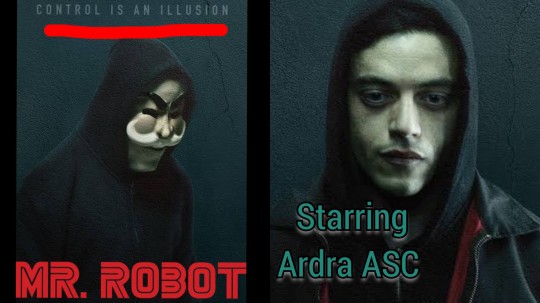
Ardra is quite contradictory, as it aims to expose truth by ruthlessly shining light on it ("control is an illusion") and therefore breaking the illusion, despite literally being ruled by the most illusory planet, Rahu. Rami Malek is an Ardra Ascendent and in the series Mr. Robot, he plays a cybersecurity engineer who uses his rare intelligence (Gemini/Mercury) to take down an evil conglomerate that controls the world & gets away with terrible world crimes that are swept under the rug. The Ardra character is already established as not a truth seeker, but someone who is already aware of everything and has been long disillusioned. The other important main characters also seem to be played by Rudra influenced actors which I found so incredible. These key characters show different dysfunctional aspects of society, almost critiquing them. Though Rudra is more potent through Ardra, Rudra has incarnated in different forms. Aja Ekapanda, Ahir Bhudhanya - Purva Bhadrapada, Uttara Bhadrapada. And Goddess Kali has associations with Rudra, and it rules the nakshatra Mula - which forms the axis with Ardra (being Sagittarius-Gemini). All the Rudra nakshatras are scattered across the main cast of Mr. Robot.

Another similar piece of media that is linked with Ardra and anarchist/political themes that expose heavy truths of society and elite powers of the world is the film V FOR VENDETTA, which leans more into anti-fascism. Starring an Ardra native.
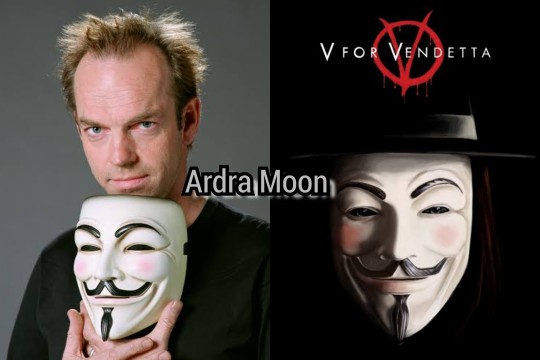
Ardra faces the reality of things that is usually harsh and too overwhelming for others to bare, the kind of truth that is often not thought of. The series The Boys shows what would realistically happen if superheroes were a thing — none of that Marvel sugarcoating shit. Just like Rami Malek's character in Mr. Robot, the character Billy Butcher played by Karl Urban is already established as one who knows the harsh reality of superheroes (being monsters and corporate puppets) and is portrayed as an angry, disgruntled, dissatisfied person. And of course there is Rahu/Ardra influence.
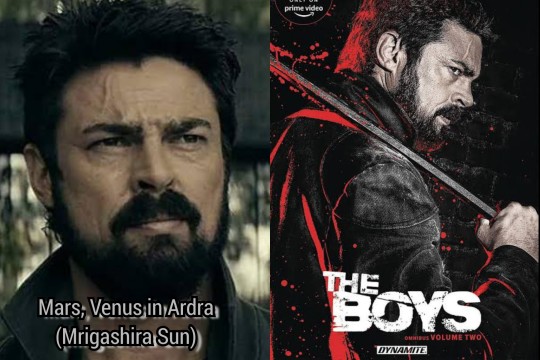
Ardra is not always about dethroning corrupt powers. It can simply manifest into meaningless chaos, purposeless anarchy as seen in Heath Ledger's Joker who only makes chaos to prove the hypocrisy in people and society. This critical nature is always within Ardra, no matter how chaotic and senseless it manifests.
Yes he's an Ardra Moon.
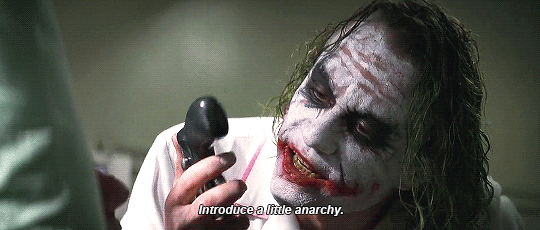
It's always interesting how nakshatras with the same planetary rulership can share the same themes, despite the differences in their ruling deities. The film, Joker (2019), criticizes how society treats its ostracized members. And the character Arthur Fleck, being played by Swati Sun Joaquin Phoenix, unintentionally (and unknowingly) drives pure anarchy in the streets. Becoming the face of a movement spawned around him, called 'Jokerism'. And these masks, just like in MR. ROBOT (fsociety), V For VENDETTA, make the symbol of the movement.
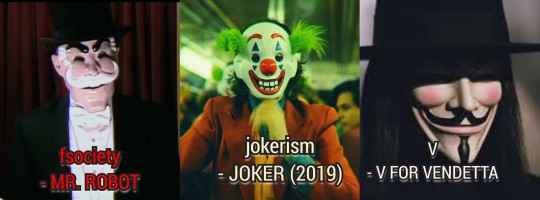
I also find it interesting that Zoro is a masked vigilante who fights against the injustice and victimization of the lower class and indigenous people. Shatabhisha can act as a saviour in this case, more than what is seen from Ardra and Swati.
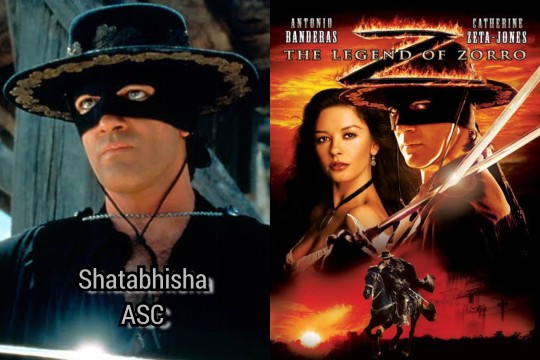
The character Hobie Brown being voiced by Shatabhisha Sun Daniel Kaluuya in the new Spiderverse film. Interesting enough, Shatabhisha being Aquarius can also have chaotic, rebellious and even anarchist tendencies. Aquarius emphasizes individualism, roots for the underdog and can absolutely despise authority – especially the corrupt kind (but mostly it's fuck all authority).

The nakshatra also being co-ruled by Rahu, they can see through illusions and have a simple yet realistic approach to things (Saturn). There is defiance there in Shatabhisha, but rarely ever as erratic or angry as Ardra. In fact, Shatabhisha is more on what's morally right and wrong compared to Ardra where a dualistic nature is conveyed. Shatabhisha has a tougher framework, can be very virtuous.
Shatabhisha is ruled by the deity Lord Varuna who is the personification of divine authority and moral law. The theme of authority can manifest in several ways for Shatabhisha. Rebellion against authority can go to the extreme ends of violence and unlawfulness. Or it can go into activism. Critiquing the many issues in the world that are glaringly wrong and unfair (what the modern internet now calls 'wokeism'). Themes of rebellion or exposure in a political and societal context can be linked with Swati. This can somewhat be seen in the following medias:

𝗖𝗢𝗡𝗧𝗜𝗡𝗨𝗘𝗗 𝗜𝗡 𝗣𝗔𝗥𝗧 𝗧𝗪𝗢:
#ardra#rahu#gemini#uttara bhadrapada#purva bhadrapada#mula#swati#libra#shatabhisha#aquarius#vedic astrology#sidereal astrology#vedic observations#sidereal observations#nakshatra series
327 notes
·
View notes
Text
There are honestly so many fundamental things about Ridley Scott's Napoleon I disliked, I hardly know where to start so here's just a couple things that popped into my head. All of the disappointed/angry reviews I saw really were on the money with their criticisms. Below the cut a bunch of things in no particular order
Apart from the scenes in Egypt and Elba (which are sepia-tinted) the entire movie is colorgraded with a blue-grey tone like the most painfully dreary wet day in late autumn. Just watching it I got hypothermia. Just take these two shots - the first from the 1970 waterloo movie (highly recommended, can be found for free on youtube), the second from 2023 - to see the difference.
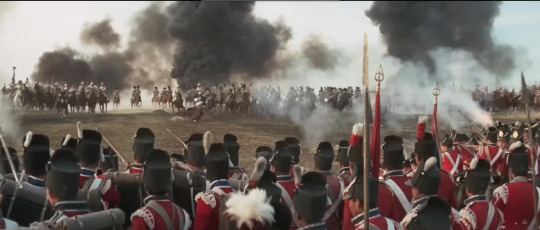
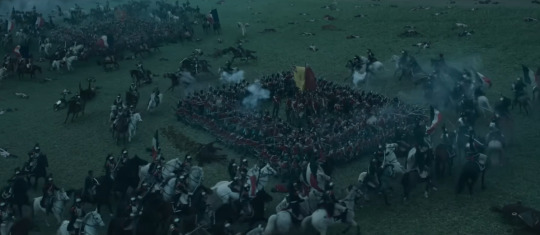
Despite a massive budget and cgi available the battles actually felt incredibly small. The Waterloo scene in particular felt like it was taking place on a patch of grass that was a 100 meters square, with two thin lines of French infantry advancing towards a relatively small group of British infantry dispersed within a couple meters of trenches, with the tents of their camp only meters directly behind that. It gave the entire thing the sense like it was a large reenactment society of maybe 200 people giving it their all, rather than 140.000. The 1970 Waterloo might be 50 years old but showed vastly, vastly more impressive scenes of huge formations of men, offering awe-inspiring cinematography compared to Scott's tiny Waterloo skirmish. I'm perfectly willing to accept disgustingly bad historical accuracy as long as the pictures are sufficiently pretty. They were not.
As a note, in the movie the British infantry inexplicably decides to walk forwards out of their fortified trenchline on the slope (complete with spikes) and form squares in front of it, instead of simply staying inside of their trenches.
There's a fucking sniper at Waterloo. Like, an infantryman with a rifle with a scope on it. He blows a golfball-sized hole in Napoleon's hat.
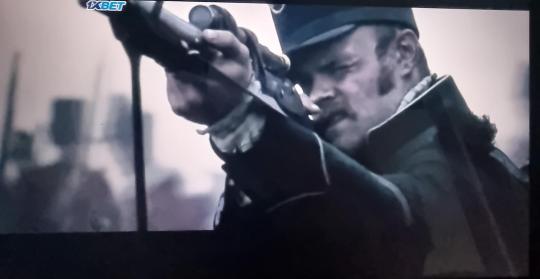
The Marshals - each colorful, fascinating characters many of whom would individually be worthy of their own movie - are less than background characters; I don't think any were even mentioned by name, and there's only two or three that are regularly seen on screen. Marshal Ney, famous, brave, tragic Ney, who has a very distinctive redhead appearance, was rendered completely unrecognizable by adding a moustache.
Phoenix's Napoleon has no charismatic presence whatsoever. Anyone who wasn't already reasonably familiar with Napoleon before seeing this movie would be dumbfounded why so many people followed him at all, or why upon his return from Elba thousands of soldiers sent to stop him simply deserted to his cause as soon as he approached. If you want to create a movie to deconstruct Napoleon from a brilliant national hero to a flawed man there are infinite ways to do so, and they chose the most sub-par by just making him kinda odd and insecure.
Napoleon's military genius is underexplored if not entirely absent from the movie, and to a large extent it simply feels like events are just kinda happening to him, especially with the way short disparate scenes are quickly strung together. One second we're in the aftermath of Austerlitz (1805), and two or three 1-minute scenes we're at the invasion of Russia (1812). Some of Napoleon's finest moments as a general are omitted from the film such as the Italian campaign, Jena-Auerstedt, and the six-day campaign of 1814 where Napoleon so thoroughly outgeneralled his opponent his tiny 30K man army inflicted nearly 30K casualties on enemy forces twice his size over the course of four battles.
Meanwhile his crowning achievement at Austerlitz is reduced to yelling thrice for hidden units to attack and then the entire enemy army flees onto an ice lake fit for a fantasy movie (just check out the ice scene from the 2004 King Arthur) and gets sunk by cannon fire. If you've seen the trailer you've seen almost the entire battle.
Huge parts of the movie are devoted to his marriage to Josephine, which I personally don't find terribly interesting to begin with, and historical events are contorted to be related to his marriage (such as ditching his army in Egypt because she's cheating on him), but it often felt to me like this storyline, such as it was, was firing in certain directions only to abruptly cut them off or let them go nowhere, and the movie seemed unsure whether it was the A-plot or the B-plot or a secret third thing.
Before I forget... not once but twice Napoleon is charging into the thick of the melee on horseback!!! First where he is at the very front of a cavalry charge at Borodino (the 30 seconds of it that we got, which were all in the trailer) and second near the end of Waterloo before making a run for it. And it's so patently absurd! It's like a WW1 movie with Kaiser Wilhelm personally storming the trenches or Emperor Hirohito flying a plane at Pearl Harbor. Napoleon demonstrated plenty of bravery in his life (such as when he was wounded by a bayonet at Toulon, or attempted to lead a charge at the bridge at Arcole) but the Emperor of the French was not at the fucking forefront of a massed cavalry charge with sabre in hand scything down infantrymen.
The movie ends with a card with casualtyfigures from a bunch of battles as if it's a sobering statement at the end of a Holocaust movie, so the Brits can remind you Napoleon was actually Hitler.
#napoleon movie#I've seen bad movies in my life but I've never been so disappointed by one#I wanted it to be good. And it was the opposite.
14 notes
·
View notes
Text
"Exploring the Dark World of the Joker: A Psychological Thriller and Box Office Success"

The movie "Joker" is a psychological thriller released in 2019. It tells the story of Arthur Fleck, a failed stand-up comedian who later becomes the criminal mastermind known as the Joker. Set in Gotham City during the 1980s, the film explores themes of mental illness, societal inequality, and the consequences of an indifferent society. 🎥🃏
"Joker" received critical acclaim for its dark and gritty take on the character, as well as its examination of social and political issues. Joaquin Phoenix's performance as Arthur Fleck, which earned him an Academy Award, was particularly praised. The movie was both a critical and commercial success, grossing over $1 billion worldwide. 🏆💰
Despite its positive reception, "Joker" also faced controversy due to concerns over its portrayal of violence and the potential impact on real-world behavior. However, it remains a significant addition to the superhero genre, offering a fresh and introspective perspective on one of Batman's most iconic adversaries. 🎭
Read the original article on Bitcoin.com Related Hashtags: #Joker #DCComics #JoaquinPhoenix #Superhero
0 notes
Text
Discussion week 2
Celebrities can leverage their influence and power for social good by actively engaging in philanthropy, supporting charitable organizations, and using their platforms to raise awareness about important social issues. They can contribute financially to causes they believe in, participate in charity events, and encourage their followers to do the same. By lending their voices to marginalized communities and advocating for positive change, celebrities can help amplify important messages and push for social justice. Additionally, they can use their influence to promote sustainable practices, environmental conservation, and ethical business practices, encouraging their fan base to adopt similar values.
While celebrities may not become traditional superheroes, they can certainly be heroes for social change. By using their fame to shed light on critical issues, they can influence public opinion, inspire activism, and drive policy changes. Their ability to capture attention can be harnessed to mobilize people and resources for impactful social initiatives. By consistently championing causes and leveraging their networks, celebrities can contribute significantly to addressing societal challenges and accelerating positive change.
The nature of celebrityhood is indeed undergoing a transformation in an era of superstorms and global issues. Social media has democratized fame, allowing individuals to become influencers and advocates for social good without traditional celebrity status. Celebrities are increasingly using their platforms to address pressing global issues, fostering a more socially conscious culture. The public's expectations are evolving, and audiences are demanding authenticity, accountability, and a commitment to social responsibility from celebrities. This shift is pushing celebrities to be more mindful of their influence and actively engage in social and environmental causes.
Taxing celebrities at a high rate for their private jet usage could be a step towards addressing the environmental impact of their carbon emissions. However, it might not be a comprehensive solution. A more effective approach could involve implementing broader policies to regulate and reduce carbon emissions from all sources, including private jets. Encouraging the adoption of sustainable aviation technologies, promoting alternative transportation methods, and raising awareness about the environmental consequences of excessive travel could contribute to a more comprehensive and lasting solution to the climate crisis.
Rewarding celebrities aligned with social causes can involve acknowledging and celebrating their efforts through awards, public recognition, and positive media coverage. Fans can also play a role by supporting celebrities who actively contribute to social causes. To discern greenwashing from true commitment, it's essential to scrutinize the consistency of their actions over time, assess the depth of their involvement in social causes, and verify the impact of their contributions. Transparent communication and tangible results in promoting sustainability and social responsibility are key indicators of genuine commitment.
6.Imagining the next generation of admired celebrities, they might be known for their multifaceted contributions to society. A future celebrity could be recognized for leveraging their influence to tackle complex global issues such as climate change, inequality, and mental health.
Meet Phoenix Nebula: A Renaissance Icon for Equality and Innovation
Phoenix Nebula, born in the pulsating heart of the 2030s, is a visionary force reshaping the landscape of celebrity influence. Beyond the captivating performances that have made her a global sensation in film and music, Phoenix is renowned for her revolutionary contributions to societal change. With a commitment to inclusivity and cutting-edge advancements, she has transcended the conventional boundaries of celebrity stardom.
From the outset of her career, Phoenix Nebula has championed causes close to her heart, establishing the Nebula Foundation, a non-profit organization dedicated to fostering innovation, equality, and access to education. The foundation's initiatives range from funding STEM programs in underprivileged communities to advocating for LGBTQ+ rights globally.
Phoenix is not only a trendsetter in entertainment but also a trailblazer in sustainable fashion. Her collaboration with eco-conscious designers has redefined red carpet glamour, showcasing that style and environmental responsibility can coexist. Her fashion choices have sparked a movement towards conscious consumerism, inspiring fans to embrace ethical and sustainable lifestyles.
The bio of Phoenix Nebula reflects not just her achievements in the entertainment industry but also her pioneering spirit in technology. Recognized for her investments in clean energy startups and advocacy for tech education, Phoenix has become a prominent figure at the intersection of entertainment and innovation. Her annual Nebula Tech Summit has become a gathering of minds, fostering collaborations to address global challenges through technological solutions.
Phoenix Nebula's social media presence is a dynamic tapestry of activism, artistry, and insight. Her platforms serve as a space for open dialogues on social justice, mental health, and the transformative power of technology. Through engaging content and thought-provoking discussions, Phoenix connects with her audience on a deeper level, encouraging them to be catalysts for positive change.
In an era where celebrityhood is synonymous with responsibility, Phoenix Nebula stands as a symbol of the evolving role of public figures. Her life's work exemplifies the potential for celebrities not only to entertain but to inspire, innovate, and lead humanity towards a more inclusive, sustainable, and technologically advanced future.

0 notes
Text
Analysis of A Pigeon Named Phoenix
Edexcel GCE A Level in Chinese is an academic qualification offered by Edexcel, a UK-based examination board. The course focuses on the study of Chinese literature and film, with an emphasis on critical analysis and interpretation of prescribed texts. The course aims to develop students’ proficiency in the Chinese language, as well as their understanding of Chinese culture, history, and society.…
View On WordPress
0 notes
Text
The Clown Prince of Crime

Title: Joker (2019)
The Joker is a character that has been a part of popular culture for decades, captivating audiences with his unpredictable and chaotic nature. The latest Joker movie, directed by Todd Phillips and starring Joaquin Phoenix, explores the origins of this infamous villain and the events that led him to become the Clown Prince of Crime.
Released in 2019, the film received critical acclaim for its bold storytelling and Phoenix's powerful performance as the troubled Arthur Fleck. The movie is set in the early 1980s in Gotham City, a metropolis plagued by crime and corruption. Arthur is a failed comedian who suffers from a condition that causes him to laugh uncontrollably, even in the most inappropriate situations.
As Arthur struggles to make a living and take care of his sick mother, he faces constant rejection and ridicule from those around him. His life takes a dark turn when he is brutally attacked by a group of teenagers while working as a clown for hire. This incident sets in motion a series of events that lead Arthur to embrace his alter ego, the Joker.
What sets this movie apart from other portrayals of the Joker is its emphasis on mental illness and social inequality. Arthur's descent into madness is not simply the result of his inherent evil, but rather a product of a society that has failed him. Throughout the film, we see the harsh realities of poverty, mental illness, and societal neglect.
Phoenix's performance as the Joker is truly remarkable, showcasing his ability to transform into a character completely. He portrays the Joker as a tortured soul, a man who has been pushed to the brink and has nothing left to lose. The film's score, composed by Hildur Guðnadóttir, also adds to the overall tone of the movie, creating a sense of dread and unease throughout.
While the movie received critical acclaim, it also sparked controversy for its portrayal of violence and mental illness. Some criticized the film for glorifying the Joker's actions and promoting a dangerous message. However, the film's creators have defended their work, stating that it is meant to start a conversation about important issues that affect our society.
Overall, the latest Joker movie is a thought-provoking and intense exploration of a complex character. It delves into the origins of the Joker, shedding light on the societal factors that led him to become one of the most iconic villains in pop culture. Phoenix's performance is a tour-de-force, and the film's themes of mental illness and social inequality make it a relevant and timely work of art.

THE GOOD:
While the movie has been the subject of some controversy, it has several good points that make it a must-watch for fans of the superhero genre and cinema in general.
One of the most significant good points of Joker is its portrayal of mental illness. The movie does an excellent job of humanizing the character of Arthur Fleck and showing his struggles with mental health issues. Rather than demonizing or sensationalizing mental illness, the film depicts it in a realistic and nuanced manner, which is refreshing to see. Joaquin Phoenix's performance as Arthur Fleck is particularly noteworthy, as he convincingly portrays the character's struggles with mental illness and the resulting impact on his life.
Another good point of Joker is its cinematography and direction. Todd Phillips has created a visually stunning film that is both gritty and realistic. The movie's use of muted colors and dark lighting creates an eerie atmosphere that perfectly matches the character of Joker. The film's soundtrack, composed by Hildur Guðnadóttir, is also exceptional and adds to the overall tone and mood of the movie.
The film's commentary on society and the class divide is another good point that sets it apart from other superhero movies. Joker depicts a society that is failing its citizens, particularly those who are marginalized or living in poverty. The film does an excellent job of highlighting the social and economic issues that lead to the rise of individuals like Joker. It offers a critical examination of the way society treats those who are struggling, which is a much-needed message in today's world.
Finally, Joker's exploration of the nature of evil is another good point that deserves recognition. The movie raises thought-provoking questions about the origins of evil and the extent to which society and individuals contribute to its emergence. By humanizing the character of Joker and portraying him as a victim of circumstance, the film challenges traditional notions of good and evil and encourages audiences to think more deeply about the forces that shape our lives.
In conclusion, Joker is a movie that has several good points that make it worth watching. From its realistic portrayal of mental illness to its exceptional cinematography and direction, the film offers a unique take on the superhero genre. Its commentary on society and the class divide, as well as its exploration of the nature of evil, make it a thought-provoking and compelling movie that will leave a lasting impact on viewers.

THE BAD:
One of the significant criticisms of Joker is that it glorifies violence and promotes a nihilistic worldview. The film portrays the protagonist, Arthur Fleck, as a disturbed and mentally ill individual who turns to violence as a way of expressing his frustrations and anger. While the movie tries to show that his actions have consequences, some viewers argue that the film fails to convey a strong message against violence and instead romanticizes it.
Another issue with the movie is its portrayal of mental illness. While it is essential to raise awareness about mental health issues, some people believe that Joker perpetuates harmful stereotypes and stigmatizes people with mental illnesses. The film portrays Arthur Fleck as a deranged and unpredictable character, which could reinforce the stereotype that mentally ill people are inherently violent and dangerous.
Furthermore, some critics have raised concerns about the lack of diversity in the film's cast and crew. The movie predominantly features white male characters, and the director and screenwriters are all white men. This has led to accusations of the film being insensitive to issues of representation and diversity.
Finally, some viewers have criticized Joker for its graphic and violent scenes, which could be triggering for some people. The movie contains scenes of gun violence, murder, and suicide, which could be disturbing for some viewers, particularly those who have been affected by similar events in real life.
In conclusion, while Joker has received praise for its technical aspects and performances, it also has several bad points that have been criticized by some viewers. These include its portrayal of violence and mental illness, lack of diversity, and graphic scenes. It is important to acknowledge these issues and have a critical discussion about the movie's impact on society and its message to the viewers.

THE FINAL THOUGHTS/RATINGS:
The film "Joker" is a powerful and thought-provoking exploration of mental illness, society's treatment of the mentally ill, and the consequences of neglecting those who are most vulnerable. The movie presents a dark and gritty portrayal of the origin story of the iconic villain, the Joker, brilliantly played by Joaquin Phoenix.
Throughout the film, the audience witnesses the slow descent of the Joker, a struggling comedian, into madness and violence. The film's powerful performance and direction highlight the dangers of failing to address mental illness and the devastating effects that social isolation, poverty, and trauma can have on individuals.
Overall, "Joker" is a masterful and disturbing film that challenges viewers to reflect on their own attitudes toward mental illness and the consequences of neglecting those who suffer from it.
RECOMMENDATION:

The movie is a psychological thriller that dives into the mind of a disturbed individual and examines the societal factors that contribute to his descent into madness. Joaquin Phoenix delivers an outstanding performance, bringing a nuanced and complex portrayal of the character to life.
However, "Joker" is a mature and intense film that deals with graphic violence and disturbing subject matter. Therefore, it may not be suitable for all audiences, especially those who are sensitive to such content.
In summary, my recommendation would be to approach the movie with an open mind and consider whether you are comfortable with mature themes and violent content before watching it. If you enjoy psychological dramas and character studies, you may appreciate the movie's artistic merits and Joaquin Phoenix's performance. But if you are sensitive to graphic violence or feel uncomfortable with the subject matter, it may be best to skip this film.
Writers: Bolima, Abad, Karlo, Alden, Sto Domingo
1 note
·
View note
Text
"I am naturally anti-slavery. If slavery is not wrong, nothing is wrong. I cannot remember when I did not so think, and feel," declared President Abraham Lincoln in April 1864, less than a year before the American slave trade was abolished under his premiership. Yet, 157 years later, slavery is still by no means eradicated; according to the charity Anti-Slavery International, there is still a staggering 50 million people entrapped in modern slavery around the world. The trade has and forever will leave a blotch on societal conscience, a heinous, inhumane evil that is almost unimaginable to those in today’s civilized societies.
Amistad
Spielberg sets sail in his 1997 movie, Amistad, starring Djimon Hounsou, Morgan Freeman, Anthony Hopkins, Matthew McConaughey, and Chiwetel Ejiofor, the movie follows the story of a Spanish slave ship, La Amistad, heading for Cuba. Those enslaved spark a mutiny on board, led by Joseph Cinque (Hounsou), and successfully capture the ship and plan to sail it back to Africa. Cinque and his fellow countrymen entrust La Amistad’s navigators to plot a safe passage home, only to be betrayed.
Lincoln
Steven Spielberg’s two-and-a-half-hour epic won Daniel Day-Lewis his second Academy Award. The Phantom Thread actor stars in the titular role of the 16th President of the United States, Abraham Lincoln. The film concerns the latter period of the former president’s life as he attempts to unite a warring nation and bring an end to the devastating disease that was slavery, that ravaged the lives of so many. Lincoln represents a turning point in American (and world) history, an exploration of how abolition was achieved while also being right in the midst of a civil war.
Related: Here Are Some of the Best Cinematic Historical Dramas
Gladiator
Ridley Scott’s Gladiator isn’t a film that would immediately jump out as your typical film on slavery. Though, Scott’s representation of the slave trade within the Roman Empire is of accurate origin, with most gladiators brought to the arena in shackles and owned by the rich and powerful. Maximus (a great Russell Crowe) is a celebrated war hero with distinguished service to Emperor Marcus Aurelius, who offered him the title of Caesar following his death, despite his own son, Commodus (a wicked Joaquin Phoenix), being next-in-line.
Following Marcus’ demise via the hand of his own son, Maximus is sold into slavery and so his adventure as a gladiatorial entertainer begins. Gladiator is an undeniable epic, in scale, narrative, and critical reception. From the set-pieces in the Roman amphitheaters to the huge emotions and performances on display, it's a heartbreaking but honest example of how slavery is the byproduct of power, corruption, and the fears and jealousies of the people in charge.
Django Unchained
Jamie Foxx stars alongside Christoph Waltz and Leonardo DiCaprio in Quentin Tarantino’s punchy Western Django Unchained. Dr. King Schultz (Waltz), a bounty hunter posing as a dentist, frees Django Freeman (Foxx) in return for his help identifying three wanted criminals. Subsequently, the pair team up and embark on a mission to locate Django’s wife, Broomhilda (Kerry Washington), a slave at the infamous Candie Plantation, run by the devilish Calvin Candie (DiCaprio).
Django Unchained is a picture that oozes style but backs it up with an abundance of substance. Jamie Foxx plays a slave reborn, empowered by his freedom, he’s feasibly the first man to ever make a prince aristocrat outfit look cool. Much was made prior to Django Unchained, of how Leonardo DiCaprio was yet to scoop an Academy Award, and while that wasn’t to come until three years later with The Revenant, his performance as the depraved Calvin Candie certainly deserved Oscar recognition.
Spartacus (1960)
Stanley Kubrick was all too familiar with the word “epic,” and his 1960 film Spartacus featuring the phenomenal Kirk Douglas and Laurence Olivier is precisely that. It is a story of bravery, courage, and vigor, which follows Thracian Spartacus (Kirk Douglas), a man enslaved his entire life, who takes a stand against his authoritarian owners, and is consequently sold to Batiatus (an Oscar-winning Peter Ustinov), a gladiator trainer. Spartacus’ life changes after he and his fellow gladiators escape their captors.
A film that was deeply allegorical for the time (written by a blacklisted author about the McCarthy witch hunts), Spartacus remains a timeless depiction of the cruelties of the proverbial State, the inherent dignity of the individual, and the power that powerless people can create from unity.
12 Years a Slave
12 Years a Slave is a poignant yet horrifyingly disturbing depiction of slavery 20 years prior to its abolition. Based on the memoir of Solomon Northup, director Steve McQueen’s screen adaptation provides possibly the most comprehensively graphic illustration of the sheer scale of the atrocities of slavery. A free man and musician, Solomon (Chiwetel Ejiofor) lives in the state of New York with his wife and children but is drugged, taken to Washington D.C., and sold into slavery.
Related: Here's 5 Great Films That Fight for Civil Rights
His protestations fall on deaf ears, and while he’s initially sold to a relatively forgiving man, Mr. Ford, the unscrupulous and pathetically evil plantation carpenter John Tibeats takes a disliking to him, and soon Solomon is moved on to work for the menacingly brutish Mr. Epps. It’s at Epps’ plantation that Solomon endures the most persistent emotional and physical abuse at the hands of his slaver.
12 Years a Slave is littered with spellbinding performances. Chiwetel Ejiofor as Solomon Northup puts in a flawless display as a man who, despite the tyrannical circumstances he has been placed under, is resolute and unwavering in the face of extreme adversity. Michael Fassbender is terrifying as Mr. Epps, the face of thousands if not millions of evil slave owners over centuries, with this malevolent, crazed glaze over his eyes, and utter contempt for the human lives under his cruel jurisdiction. Lupita Nyong’o, Benedict Cumberbatch, Brad Pitt, and Paul Dano put in equally emphatic showings. In typical McQueen fashion, no punches are pulled, and no detail is spared — we are exposed to the horrors that were carried out and the inherent racially fueled prejudice of the trade itself. You may not want to watch it again, but everybody should see it once.
0 notes
Text
WHILE STREAMERS WATCHED THEIR FLICKS BY NIGHT...
Merry Christmas Eve Eve everybody! The Phoenix Film Critics Society...

...of which Your Humble Narrator is proud to be a founding member, recently announced our 2022 Award winners. As always, some of the winners--like Best Actor--reflect my voting, others don't, but there are a lot of movies worth seeing on the list.
A few other odds and ends...
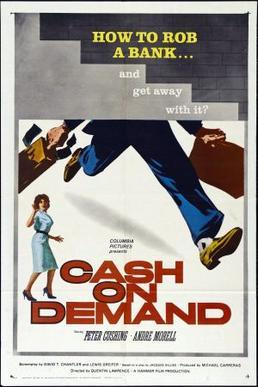
Cash on Demand--Last week I was shown this 1961 gem I had never caught up with, a no-kidding Christmas movie from Hammer Films! It's available on DVD; I highly recommend. Peter Cushing plays a joyless bank manager, cold and critical toward his employees, who gets his Christmas Eve ruined when a suave bounder (Andre Morell) tells him that his cohorts are holding Cushing's wife and son hostage while he plunders the vault at the provincial branch. Cushing, unsurprisingly, is great--despicable at first, gradually shading into sympathy as his desperation rises--and Morell is sensational, in maybe the best role he ever had, as the sinister yet curiously charismatic thief.
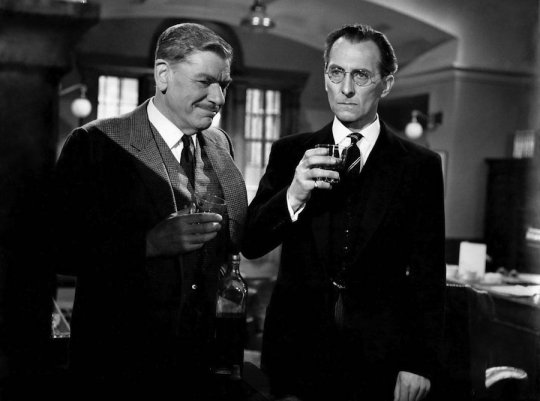
Richard Vernon nicely leads the small ensemble that plays the branch employees. It's a gripping, imaginative caper, though of course it's just one more variation on the Scrooge story, with the robber serving as a felonious Ghost of Christmas Present.

Something From Tiffany's--Two guys, played by Ray Nicholson (Jack's kid) and Kendrick Sampson, buy jewelry at the title shop as Christmas presents for their respective lady friends (Zoey Deutsch and Shay Mitchell). One's a pair of earrings; the other's an engagement ring. A mishap mixes up the gift bags, and wackiness ensues. I was recently pointed toward this romcom, streaming on Prime. It's very undemanding, but it's inventive, Zoey Deutsch makes a sweet heroine and her costars, including the great Rose Abdoo as the Tiffany's clerk, are pleasant company. And it seems like it's a cut above most of the Hallmark Christmas movies.

American Murderer--A stalwart FBI man played by Ryan Phillippe searches for fugitive Jason David Brown, who was on the Ten Most Wanted List at the same time as Osama bin Laden and Whitey Bulger for killing an armored car guard here in Phoenix in November of 2004. As Phillippe talks to Brown's family and acquaintances we get his story in flashback (it's often different from what they're telling the agent). I'm late to the party on this true-crime drama released earlier this year, written and directed by Matthew Gentile and available on various streaming platforms. Don't let the poster fool you into dismissing this as a routine action flick; it's an absorbing feature debut for Gentile, a tense, believable piece of work, full of disturbing scenes that feel like something you'd witness as a passerby. Soap actor Tom Pelphrey plays Brown as a tightly-wound obsequious hustler, sort of a coked-up Eddie Haskell. Though he worms his way into the house and bed of his single-mom neighbor (Idina Menzel) and plays video games with her son, and though he can still get over on his own siblings, his Mom (Jacki Weaver) has long since recognized him for the callous creep he is. But even he isn't prepared for the psychic weight of murder, and Gentile gets across this internal horror impressively. It's worth checking out, maybe after Christmas.
#american murderer#something from tiffany's#cash on demand#phoenix film critics society#matthew gentile#kendrick sampson#zoey deutch#peter cushing#hammer films#jacki weaver
0 notes
Text
Awards Season 2022-23: Awards Round-Up 12/16
Awards Season 2022-23: Awards Round-Up 12/16
I can’t blame them. Winning 33 awards from 9 separate groups must be exhausting.
Here’s the drill: it obviously would take too long to put together separate posts for every awards group that announces. But I like to cover and discuss as many groups as possible. What I did last year, and am doing this year, is listing off the categories and listing who gave which film what award. Usually, these…

View On WordPress
#2022 Films#2022 in Film#Atlanta Film Critics Circle#Awards Season 2022-23#Boston Society of Film Critics#Chicago Film Critics Association#Film Awards#Las Vegas Film Critics Society#Los Angeles Film Critics Association#New York Film Critics Online#Phoenix Critics Circle#Southeastern Film Critics Association#Washington D.C. Area Film Critics Association
0 notes
Text
instagram

Phoenix Film Critics Society 2021 Awards • Winners
Best Picture - Belfast
Best Director - Kenneth Branagh
Best Screenplay - Kenneth Branagh
Best Actor in a Supporting Role - Ciarán Hinds
Best Performance by a Youth - Jude Hill
Remember when Phoenix honoured both Belfast and Dune with five wins?
#Tait rhymes with hat#Good times#BelfastMovie#2021#Winners#Phoenix Film Critics Society#PHXFilmCritics#13 December 2021#Belfast#Now in North America#Worldwide 2022#Instagram#Campaign To Shorten Awards Season
7 notes
·
View notes
Photo

1st
✧ The Power of the Dog released on Netflix.
✧ More TPOTD press junket! (⚠ Beware of possible spoilers!)
On Demand Entertainment.
Movie Show Plus.
FOX6 News
BackstageOL’s
The Edit.
Netflix France.
3rd
✧ Benedict wins Critics Best Actor Awards. (all of them in this section)
New York Film Critics Circle.
Atlanta Film Critics Circle.
Boston Online Film Critics Association.
New York Film Critics Online
Philadelphia Film Critics Circle.
Phoenix Film Critics Society.
Southern Eastern Film Critics Association.
Chicago Film Critics Association/CFCA.
Portland Critics Association.
Phoenix Critics Circle.
Dallas-Fort Worth Film Critics Association.
Nevada Film Critics Society.
Dublin Film Critics Circle.
✧ “Adapting TPOTD” film featurette.
✧ Benedict in this TPOTD promo clip for Netflix.

4th
✧ TPOTD - A Tight-Knit Ensemble Drives Jane Campion’s Award-Winning Western.
6th
✧ Making of ‘Power of the Dog’. THR article.
7th
✧ Virtual Film Q&A: TPOTD. (Event not available.)
Fans pics and clips: x x x
✧ Benedict was included in The New York Times’ Best Actors of 2021 list. + New photoshoot (Gallery.)

8th
✧ In Conversation with the Filmmakers and Cast of The Power of the Dog | Netflix

10th
✧ TPOTD behind the scenes | Ari Wegner.
11th
✧ TPOTD | Hair and Makeup featurette.
✧ Benedict in a TPOTD promo clip for Netflix Japan.
13th
✧ Benedict placed first in the gender-neutral Best Performance category of 2021 Indiewire survey.
✧ Benedict joins the cast of “Spider-man: No Way Home” to promote the movie on Jimmy Kimmel live! x x x

✧ “Spider-Man: No Way Home” World Premiere. (Gallery)

Fans clips: x x x x x x x x x
Benedict talks to fans, official clip.
Interview with Entertainment Tonight.
Extra TV.
jbwebtv.
Access Hollywood.
Marvel Entertainment.
14th
✧ Benedict chosen by Time between The 10 Best Movie Performances of 2021.
17th
✧ Interview with The Guardian.
✧Interview with DailyMail.
✧ “How Benedict Cumberbatch Transformed Into Phil Burbank” featurette.

18th
✧ Benedict and Claire Foy talks TELOLW with DigitalSpy.

19th
✧ Benedict on Laura Whitmore show on BBC Radio 5. (Benedict starts at 1:05:55) - Available for a few days more.
22nd
✧ First official teaser for “Doctor Strange in the Multiverse of Madness”!

✧ First official teaser poster!

✧ Benedict Cumberbatch on TPOTD and toxic masculinity.
25th
✧ TPOTD production book on-line. (Direct link.)

28th
✧ Benedict Cumberbatch, and others, reveal most daunting experiences on set.

✧ Benedict and Claire Foy talks TELOLW with Cosmopolitan.
✧ Benedict and Claire Foy on Louis Wain: The Man Behind the Cats.
30th
✧ Letters Live released a letter from Rifleman Cyrus Thatcher, read by Benedict back in October.

»»———FIN———-««
#benedict cumberbatch#benedictcumberbatchedit#benedict monthly#december 2021#the power of the dog#spiderman no way home#the electrical life of Louis Wain#doctor strange#doctor strange in the multiverse of madness#letters live#Jimmy Kimmel Live!#long post#news#my post#this was anoter active month! i´m sure i missed something#but i think the most part of it is here#last report of 2021!#happy new year!
106 notes
·
View notes
Photo








hayden panettiere as sheryl yoast in remember the titans (2000)
las vegas film critics society and phoenix film critics society nominee for youth in film, young artist awards winner for young supporting actress
61 notes
·
View notes
Text
An Important Announcement
Hello all!
Inspired by this brilliant and insightful post by @disagreeingpoets, we decided to speak up about our intentions of the Dead Poets Society Musical and how we intend to handle the issues raised in the post.
We, at the DPSM team, believe in equal rights for everyone and we wholeheartedly acknowledge the outdated and problematic values and ideas in the film. In our musical, we are doing our best to rewrite and rectify the mistakes of the movie.
In no way would we ever want to offend or upset any marginalised communities or minorities; in fact, we want to do the opposite, by emphatically discussing and bringing awareness to the issues found in the film, such as the racism, cultural appropriation, sexist treatment of women as a commodity and the trivialisation of sexual assault.
If you have any questions or concerns on our revisions of these issues, feel free to comment or message us. We are always open to your constructive criticism and queries; we won't shut your concerns away because this project is for the fans and it always will be.
Thanks so much for reading and supporting us.
Love always,
Jade, Phoenix, Sarah and Oriana
P.S. Happy Pride Month! 🏳️🌈🏳️⚧️ Remember to give your local member of the LGBTQIA+ community one million dollars this month! Also a big kiss. Most of us need it. (In all seriousness, love you guys! We know there are plenty of you in the DPS[M] family.)
#dead poets society#dps#dps musical#dead poets society musical#dpsm#neil perry#todd anderson#charlie dalton#knox overstreet#steven meeks#stephen meeks#stev/phen meeks#gerard pitts#richard cameron#mr keating#john keating#robin williams#robert sean leonard#ginny danburry#chris noel#ethan hawke#dark academia#carpe diem#seize the day
37 notes
·
View notes